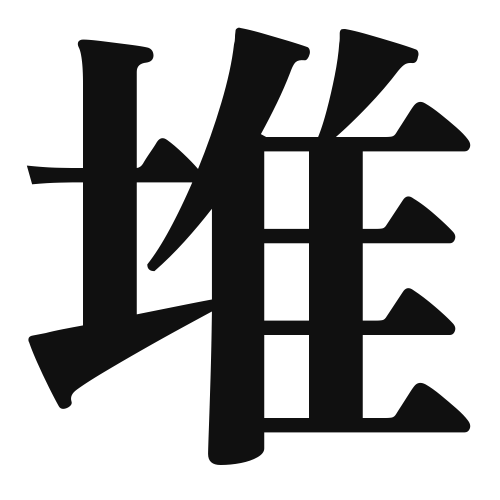1. Overview of Meaning
The kanji “堆” (pronounced “dai” or “tai”) generally means “to pile up” or “to heap.” It conveys the idea of stacking or accumulating objects, often in a disorganized manner.
2. Formation and Radical
Formation of the Kanji: The kanji “堆” is a compound character (会意文字) that combines elements to convey its meaning. It consists of the radical “土” (meaning “earth” or “ground”) and the phonetic component “堆,” which suggests the action of piling.
Radical: The radical of “堆” is “土,” which is commonly associated with earth, soil, or land-related concepts.
3. Examples of Usage
Common Words and Phrases: Some frequently used words that include “堆” are:
- 堆積 (たいせき, “taiseki”) – accumulation, piling up
- 堆肥 (たいひ, “taihi”) – compost
Example Sentences in Daily Conversation:
- 「この場所には本が堆積しています。」(Kono basho ni wa hon ga taiseki shiteimasu.) – “There are piles of books in this place.”
- 「庭に堆肥を作っています。」(Niwa ni taihi o tsukutteimasu.) – “I am making compost in the garden.”
4. Synonyms and Antonyms
Similar Kanji: A kanji with a similar meaning is “積” (せき, “seki”), which means “to accumulate” or “to stack,” but it often implies a more organized or intentional action compared to “堆.”
Antonyms: An antonym of “堆” could be “掃” (そう, “sou”), which means “to sweep” or “to clear away,” indicating the action of removing or tidying up rather than piling up.
5. Cultural and Historical Background
Relation to Japanese Culture: The concept of piling up is often seen in traditional Japanese practices, such as in the preparation of rice or in the arrangement of seasonal decorations.
Proverbs and Idioms: While there may not be specific proverbs that directly use “堆,” the idea of accumulation can be reflected in sayings about the importance of building knowledge or resources over time.
